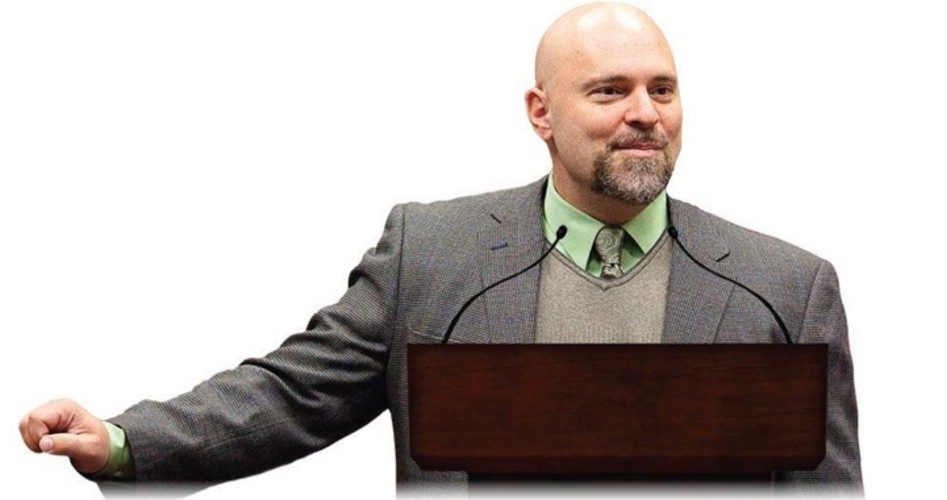
MADISON, Wis. — As an outspoken conservative on a liberal campus, it’s not a stretch to say Dr. James “Duke” Pesta (shown) has a target on his back.
But the University of Wisconsin-Oshkosh English professor says his professional reputation has been dragged through the mud by the university’s questionable investigation into a bogus complaint and a student newspaper story steeped in sensationalism.
In December, the Advance-Titan published a story with the provocative headline, “Hate speech or misunderstanding?”
The piece culled from the 2017 complaint filed by an unnamed female student in Pesta’s class, and the investigation that followed. A Brown County Circuit Court Judge ordered the documents released late last year.
Written by Advance-Titan managing editor Joseph Schultz, the story focuses on the student’s allegations that she was harassed because of her gender. But the lengthy piece fails to mention until the second to last paragraph that “the university found Pesta did not harass or discriminate against the student.”
Also missing in the story is why Oshkosh administration changed the classification of the complaint. The student’s original grievance accused Pesta of harassment based on her “political identity.” There are no such protections at institutions of higher education that purport to be guardians of free expression.
Schultz did not return Empower Wisconsin’s request for comment. Carter Uslabar, editor of the student newspaper, emailed that he would be in touch but did not respond to questions regarding the story.
Asked about the investigation, UW-Oshkosh spokeswoman Peggy Breister said the university had no comment because the investigation involved a “personnel matter.”
But Pesta and his former students have plenty to say about the complaint, the way it was handled by the university and how it was sensationalized by the student newspaper.
(Article continues after video.)
The complaining student, enrolled in Pesta’s 300 level course on C.S. Lewis and J.R.R. Tolkien, alleged the professor referred to students as “snowflakes” and “tight-ass liberals,” according to the Advance-Titan story. Pesta, the student told the newspaper in an email, repeatedly went on tangents, railing against the university, feminism, environmentalism and education. She said the professor claimed that UW-Oshkosh aims to “punish and criminalize” conservatism.
Pesta “creates a hostile environment where discourse is not the goal” and that “his own agenda is seriously clouding the learning environment,” the student told the newspaper.
Pesta vehemently denies the allegations and would have done so to university investigators, he said, if they had bothered to get his side of the story. Pesta said he attempted to reach out to the investigating officer, but she hung up on him.
He said the complaining student missed a majority of classes, ultimately dropping the course to avoid a failing grade.
Pesta’s former students defended their professor and disputed the accusations against him. Empower Wisconsin interviewed a half-dozen former students who took the class dealing with Judeo-Christian literary themes at the same time as the student who filed the complaint.
“From what I read in the article, none of it was actually said,” Deryl McCauley, now a middle school teacher in Beaver Dam, told Empower Wisconsin.
Matt Coenen said he didn’t find anything inappropriate about the class, but he said he could understand that the views of the authors taught — C.S. Lewis and J.R.R. Tolkien — may make uncomfortable those who have a difficult time looking through the prism of a Christian worldview.
“I think Dr. Pesta represented the works to the best of his understanding of the views of the authors and their take on religion and philosophy,” Coenen said. “I was never offended or upset by any of the material.”
“If I’m being frank, it’s all extreme bullshit,” Andrea Toms, a UW-Oshkosh Master’s Degree student, said of the investigation and the article. Toms, who is black, said she was with Pesta when the Oshkosh reporter spoke to the professor.
“If I in any way, shape or form felt (Pesta) was (bigoted), why would I continue to take the classes with him?” she said.
The newspaper story did not include any statements from Pesta’s other students, only the female student who complained.
Pesta said he gave the reporter and his editor a dozen letters from students who were in the same class as the complainant. He claims the student reporter was “not interested in their testimony.”
Pesta has been a staunch defender of the First Amendment, and a pointed critic of the blocking of expression by liberal institutions in the name of political correctness. His student ratings are among the highest on campus, and he is a nationally recognized voice in academia and conservative thought. The students who spoke with Empower Wisconsin say Pesta keeps his politics out of the classroom while challenging his charges to think critically.
His viewpoints off campus have not always been welcome by some of his colleagues in the English department, and by the university’s administration.
The Advance-Titan piece closes with the investigation’s backhanded exoneration of Pesta.
“Even though an individual may exercise poor personal judgement or otherwise act in a manner inconsistent with the intent of university policy, not every offensive, repugnant, or inappropriate act or incident constitutes discrimination or harassment,” the investigative report concluded.
What is repugnant, Pesta said, is that teaching courses on Judeo-Christian-based literature is construed as hate speech.
“Don’t think for a minute that if a conservative student had complained about a liberal course it would have been handled in the same way, with an investigation of the professor and a student newspaper story filled with tabloid sensationalism,” the professor said.
Photo: Dr. Duke Pesta
This article originally appeared at Empire Wisconsin and is republished here with permission.



